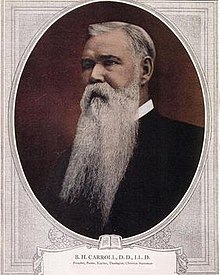B. H. Carroll
| Benajah Harvey Carroll | |
|---|---|
 |
|
| 1st President of Southwestern Baptist Theological Seminary | |
|
In office 1908–1914 |
|
| Preceded by | None |
| Succeeded by | Lee Rutland Scarborough |
| Personal details | |
| Born | December 27, 1843 Carroll County, Mississippi |
| Died | November 11, 1914 (aged 70) Waco, Texas |
| Nationality | American |
| Parents | Benajah and Mary Carroll |
| Alma mater | Baylor University |
| Occupation | Theologian, Seminary President, Author, Pastor, Educator |
| Military service | |
| Allegiance |
|
| Service/branch |
Texas State Militia Confederate States Army |
| Years of service | 1862-1864 (C.S.A) |
| Unit | 17th Texas Infantry |
| Battles/wars | American Civil War |
Benajah Harvey Carroll, known as B. H. Carroll (December 27, 1843 – November 11, 1914), was a Baptist pastor, theologian, teacher, and author.
Carroll was born near Carrollton in Carroll County in north central Mississippi, one of twelve children to Benajah Carroll and the former Mary Eliza Mallard. His father was a Baptist minister. The family moved to Burleson County, Texas in 1858.
Carroll served in the army of the Confederate States of America from 1862-1864. In 1865, at the age of twenty two, he converted to Christianity at a Methodist camp meeting after taking up a preacher's challenge to experiment with Christianity. In 1866, he took as a second wife the former Ellen Virginia Bell. The first wife was divorced for her infidelity while Carroll was at war. After her death, he married the former Hallie Harrison in 1899.
Carroll was a denominational leader both in the Baptist General Convention of Texas (of which he was a leading founder) and the Southern Baptist Convention. Much of his rise to prominence developed through proving himself a formidable foe in controversy - including debates with Texas politicians, standing for board policies and convention authority in the Hayden controversy in the Baptist General Convention, and opposing the president of Southern Seminary during the Whitsitt controversy at Southern Baptist Theological Seminary. While Carroll had Landmark tendencies, he was not the champion of the Landmark Movement some have made him to be. Of the four major controversies involving Landmark ideas, Carroll sided against the Landmarkers in three of the four. Only in the Whitsitt controversy did Carroll side with Landmarkers and, for Carroll, that controversy was about trustee authority, not Landmark beliefs.
...
Wikipedia
